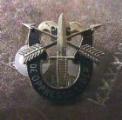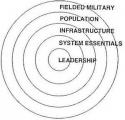2. Conditions of Insurgency: A state of mind. The conditions of insurgency arguably exist to some degree within every populace. In most cases such conditions are benign in that they are not strong enough to support the rise of a significant insurgent organization, even if manipulated by outside actors conducting UW or by ideological themes designed for this audience. As perceptions of poor governance increase so does the degree of the conditions of insurgency. Left unchecked these conditions are apt to be exploited by internal and/or external parties for purposes of their own that may or may not have the welfare of the affected populace in mind. Conditions of insurgency are caused by the government and assessed through the perspective of the populace.
3. Poor Governance: Actions or inactions on the part of governance that contribute to create conditions of insurgency within one or more significant segments of the society they govern. Poor Governance is assessed through the perceptions of each significant segment of society separately as well as collectively. Objective metrics of effectiveness of governance are immaterial to assessments of goodness.
4. Good Governance: Governance, that may be either effective or ineffective, that through the nature of its performance prevents the growth of conditions of insurgency. Subjective, and measured as assessed by each significant segment of a populace, perceptions of good governance will typically vary across a state. Where good governance exists insurgency is unlikely. Where good governance is lacking the conditions of insurgency will grow, creating vulnerability for exploitation by internal or external actors pursuing agendas that may, or may not represent the best interests of the populace. The most critical perceptions that contribute to good governance appear to be those of Legitimacy, Justice, Respect and Hope.
5. Perception of Legitimacy: The most critical causal perception contributing to the conditions of insurgency in a society. Legitimate is not synonymous with Official. It is a recognition and acceptance on the part of any significant segment of a society of the rights and duties of governance to govern. This is independent of any official or legal status of governance or any recognition of this governance by others. Historically insurgent movements will ultimately fail when this condition exists, and prevail when it is absent. The absence of legitimacy is the cornerstone of despotism.
6. Perception of Justice: A critical causal perception that contributes to the conditions of insurgency in a society as shaped by good or poor performance of governance. Justice is not synonymous Rule of Law. Perceptions of justice are based in how the populace feels about the rule of law as it is applied to them. Enforcing the Rule of Law upon a populace that perceives the law as unjust is tyranny and will make the conditions of insurgency worse.
7. Perception of Respect: A critical causal perception that contributes to the conditions of insurgency in a society as shaped by good or poor performance of governance. Measured through the eyes of the populace, the widely help perception within any significant segment of a society that they are not excluded from full participation in governance and opportunity as a matter of status. Assessments by those outside the affected populace, to include by the government, are immaterial.
8. Perception of Hope: A critical causal perception that contributes to the conditions of insurgency in a society as shaped by good or poor performance of governance. Hope resides in the absolute confidence within any significant segment of a society that they have available to them trusted, certain and legal means to change their governance. Hope is the great off-ramp for insurgency, as the presence of hope keeps politics within the established and accepted legal parameters.









 De Opresso Liber is a bad motto because it encourages such adventures...
De Opresso Liber is a bad motto because it encourages such adventures...


Bookmarks